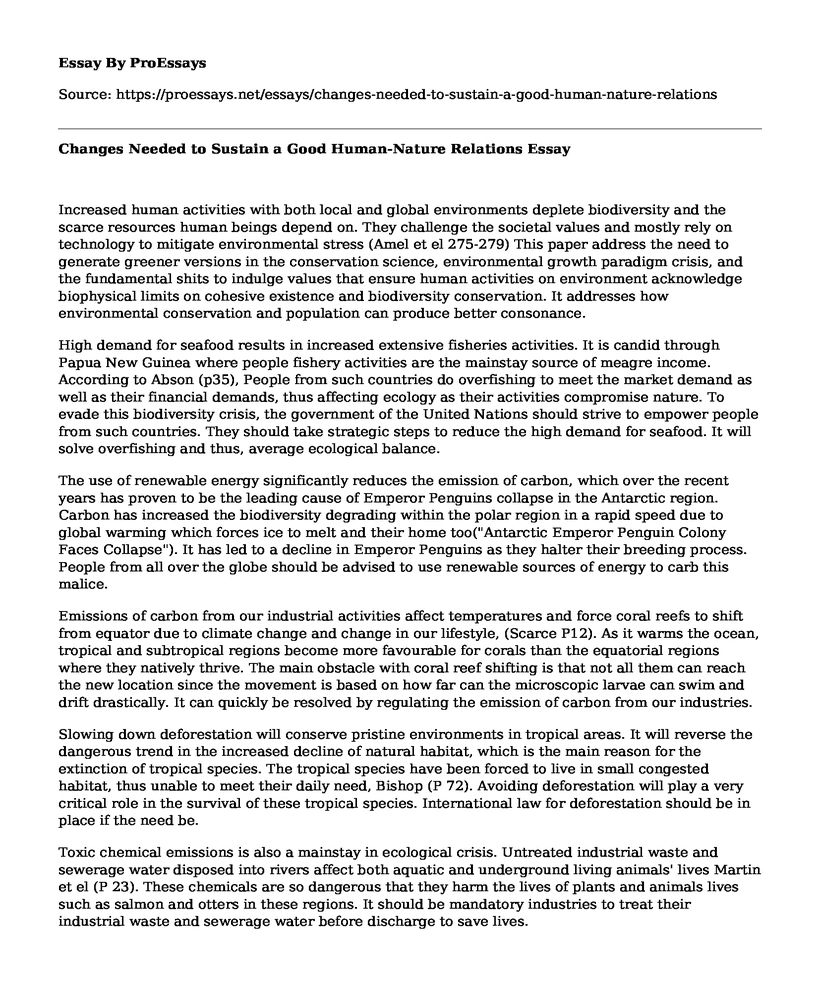Increased human activities with both local and global environments deplete biodiversity and the scarce resources human beings depend on. They challenge the societal values and mostly rely on technology to mitigate environmental stress (Amel et el 275-279) This paper address the need to generate greener versions in the conservation science, environmental growth paradigm crisis, and the fundamental shits to indulge values that ensure human activities on environment acknowledge biophysical limits on cohesive existence and biodiversity conservation. It addresses how environmental conservation and population can produce better consonance.
High demand for seafood results in increased extensive fisheries activities. It is candid through Papua New Guinea where people fishery activities are the mainstay source of meagre income. According to Abson (p35), People from such countries do overfishing to meet the market demand as well as their financial demands, thus affecting ecology as their activities compromise nature. To evade this biodiversity crisis, the government of the United Nations should strive to empower people from such countries. They should take strategic steps to reduce the high demand for seafood. It will solve overfishing and thus, average ecological balance.
The use of renewable energy significantly reduces the emission of carbon, which over the recent years has proven to be the leading cause of Emperor Penguins collapse in the Antarctic region. Carbon has increased the biodiversity degrading within the polar region in a rapid speed due to global warming which forces ice to melt and their home too("Antarctic Emperor Penguin Colony Faces Collapse"). It has led to a decline in Emperor Penguins as they halter their breeding process. People from all over the globe should be advised to use renewable sources of energy to carb this malice.
Emissions of carbon from our industrial activities affect temperatures and force coral reefs to shift from equator due to climate change and change in our lifestyle, (Scarce P12). As it warms the ocean, tropical and subtropical regions become more favourable for corals than the equatorial regions where they natively thrive. The main obstacle with coral reef shifting is that not all them can reach the new location since the movement is based on how far can the microscopic larvae can swim and drift drastically. It can quickly be resolved by regulating the emission of carbon from our industries.
Slowing down deforestation will conserve pristine environments in tropical areas. It will reverse the dangerous trend in the increased decline of natural habitat, which is the main reason for the extinction of tropical species. The tropical species have been forced to live in small congested habitat, thus unable to meet their daily need, Bishop (P 72). Avoiding deforestation will play a very critical role in the survival of these tropical species. International law for deforestation should be in place if the need be.
Toxic chemical emissions is also a mainstay in ecological crisis. Untreated industrial waste and sewerage water disposed into rivers affect both aquatic and underground living animals' lives Martin et el (P 23). These chemicals are so dangerous that they harm the lives of plants and animals lives such as salmon and otters in these regions. It should be mandatory industries to treat their industrial waste and sewerage water before discharge to save lives.
According to Broken et el (P 76), every living human being, regardless of age or gender, needs exposure to the environment to be healthy as it leads to a reduced risk of psychological disorders. Outdoor activities lower mental illness, such as depression and dementia. It is of paramount importance to get involved in outdoor activities as it contains substantial economic implication.
Results evidence that ecological balance is not only deep-rooted in technological advances, but also human day to day activities. The aforementioned human activities environment resolution will act to a critical path in maintaining a robust human-environment relationship. Its implementation will efficiently resolve the elephant surrounding ecological balance.
Works Cited
Abson, David J., et al. "Leverage points for sustainability transformation." Ambio 46.1 (2017): 30-39.
Amel, Elise, et al. "Beyond the roots of human inaction: fostering collective effort toward ecosystem conservation." Science 356.6335 (2017): 275-279.
"Antarctic Emperor Penguin Colony Faces Collapse." The Scientist Magazine, 2019,
Bishop, Ian. "Classifying human interventions in nature as a framework for ecological wisdom development." Ecological Wisdom. Springer, Singapore, 2019. 69-86.
Bocken, Nancy MP, et al. "A literature and practice review to develop sustainable business model archetypes." Journal of cleaner production 65 (2014): 42-56.
Martin, Jean-Louis, Virginie Maris, and Daniel S. Simberloff. "The need to respect nature and its limits challenges society and conservation science." Proceedings of the National Academy of Sciences 113.22 (2016): 6105-6112.
Scarce, Rik. Eco-warriors: Understanding the radical environmental movement. Routledge, 2016.
Cite this page
Changes Needed to Sustain a Good Human-Nature Relations. (2022, Mar 02). Retrieved from https://proessays.net/essays/changes-needed-to-sustain-a-good-human-nature-relations
If you are the original author of this essay and no longer wish to have it published on the ProEssays website, please click below to request its removal:
- Environmental Pollution Analysis
- The Cultural and Social Transformation of Cardiff Paper Example
- A Clean Toilet: A Necessity Not a Desire for 4.5B People - Essay Sample
- Essay Example on Floods in Indonesia: Devastation, Power Outage and More in 2020
- Progress in Achieving Clean Air: From the EPA's 1971 Launch to Today - Essay Sample
- Exploring the National Park: A Memorable Adventure - Essay Sample
- Lake Victoria's 110,000-Year Climate and Biodiversity Changes - Essay Sample







